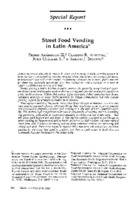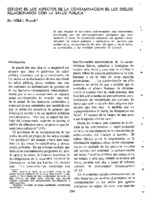Street food vending in Latin America
Date
s.d.1994
Metadata
Show full item recordAbstract
Despite occasional attempts to repress it, street food vending in Latin America appears to be on the rise- encouraged by growing marginal urban populations, the unemployed status of innumerable potential street vendors, lengthening commutes for workers, public demand for cheap and culturally appropriate food near workplaces, and a shortage or absence of regular establishments serving such food. Besides placing a hidden burden on public services, the generally unregulated and quasi clandestine street food industry tends to observe poor hygienic practices and to pose significant public health problems. Within this context, Latin America's cholera epidemics have drawn increasing attention to street food's potential for disease transmission and have created growing support for attempts to resolve these troubles. What appears needed at this point, rather than futile attempts at abolition, is a new and more positive approach wherein countries change their regulations so as to permit peaceful and constructive adaptation of street food vending to a new style of Latin American social life. This implies legal reorganization directed at structurally developing street food vending and permitting application of measures- especially provision and use of safe water- that will foster good hygiene and safe foods. It also implies creating programs to provide appropriate training for inspectors as well as health education for both vendors and consumers of street food; and it implies promoting and adopting improved methods for preparing and selling such food. There is no reason to suppose these measures will provide and immediate panacea for the street food vending problem; but there is good reason to think they can immensely improve the situation that exists today Revised version of a paper presented at the Conference "Street Foods: Epidemiology, Management, and Practical Approaches" help in Beijing, China on 19-21 October 1993. This article will also be published in Spanish in the BOSP. 118(3), 1995
Subject
Collections
Related items
Showing items related by title, author, creator and subject.
-
Pan American Health Organization; Health Systems and Services (HSS) (PAHOUnited StatesWashington, D.C., 2020)Countries that have made the most progress toward universal coverage have public expenditures in health equivalent to at least 6% of their gross domestic product (GDP), which is the percentage established in PAHO’s universal ...
-
Castro, Arachu; Sáenz, Rocío; Avellaneda, Ximena; Cáceres, Carlos; Galvão, Luiz; Mas, Pedro; Ritterbusch, Amy E.; Urbina Fuentes, Manuel (2020)[RESUMEN]. La Red de las Américas para la Equidad en Salud (RAES) es una red multidisciplinaria que promueve el intercambio de conocimientos y la acción intersectorial para la equidad en salud y los derechos humanos en las ...
-
Shuval, Hillel I (s.d.)To give an idea of the extent and long history of soil pollution as a public health problem, reference is made to the parasitic condition of the sick rural population, the decrease in living space and the consequent pollution ...




